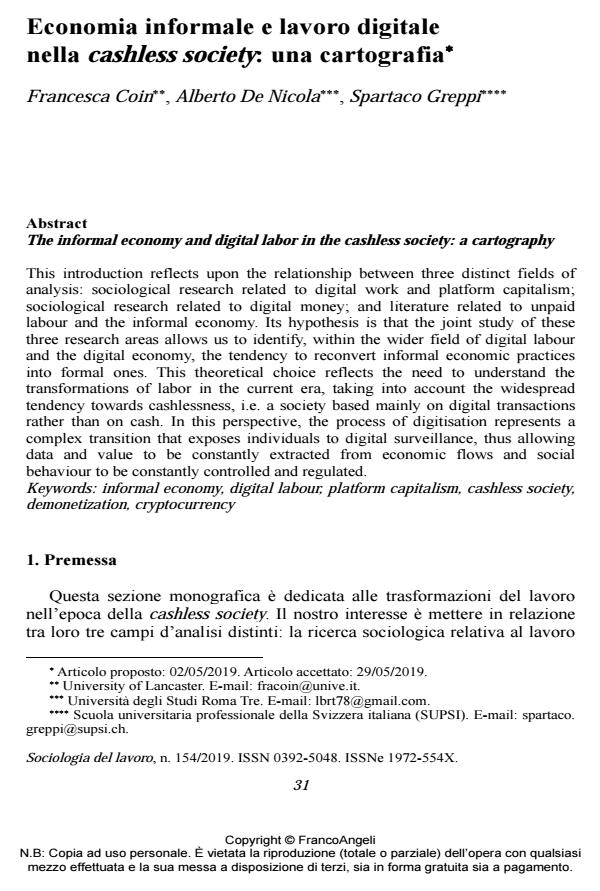Economia informale e lavoro digitale nella cashless society: una cartografia
Titolo Rivista SOCIOLOGIA DEL LAVORO
Autori/Curatori Francesca Coin, Alberto De Nicola, Spartaco Greppi
Anno di pubblicazione 2019 Fascicolo 2019/154
Lingua Italiano Numero pagine 13 P. 31-43 Dimensione file 169 KB
DOI 10.3280/SL2019-154002
Il DOI è il codice a barre della proprietà intellettuale: per saperne di più
clicca qui
Qui sotto puoi vedere in anteprima la prima pagina di questo articolo.
Se questo articolo ti interessa, lo puoi acquistare (e scaricare in formato pdf) seguendo le facili indicazioni per acquistare il download credit. Acquista Download Credits per scaricare questo Articolo in formato PDF

FrancoAngeli è membro della Publishers International Linking Association, Inc (PILA), associazione indipendente e non profit per facilitare (attraverso i servizi tecnologici implementati da CrossRef.org) l’accesso degli studiosi ai contenuti digitali nelle pubblicazioni professionali e scientifiche.
This introduction reflects upon the relationship between three distinct fields of analysis: sociological research related to digital work and platform capitalism; sociological research related to digital money; and literature related to unpaid labour and the informal economy. Its hypothesis is that the joint study of these three research areas allows us to identify, within the wider field of digital labour and the digital economy, the tendency to reconvert informal economic practices into formal ones. This theoretical choice reflects the need to understand the transformations of labor in the current era, taking into account the widespread tendency towards cashlessness, i.e. a society based mainly on digital transactions rather than on cash. In this perspective, the process of digitisation represents a complex transition that exposes individuals to digital surveillance, thus allowing data and value to be constantly extracted from economic flows and social behaviour to be constantly controlled and regulated.
Al centro di questa lettura introduttiva c’è la relazione fra tre campi d’analisi distinti: la ricerca sociologica relativa al lavoro digitale e il capitalismo delle piattaforme; la ricerca sociologica relativa alla moneta digitale e la letteratura riguardante il lavoro gratuito e l’economia informale. L’ipotesi è che lo studio congiunto di questi tre settori di ricerca consenta di riconoscere all’interno del più ampio campo della "digitalizzazione" del lavoro e dell’economia, la tendenza alla riconversione di pratiche economiche informali. Questa scelta teorica rimanda alla necessità di comprendere le trasformazioni del lavoro tenendo conto della tendenza diffusa a muovere verso una cashless society, ovvero una società fondata prevalentemente sulle transazioni digitali anziché sul contante. Questo processo di digitalizzazione espone i singoli a una vigilanza digitale che da un lato consente di estrarre dati e valore dai flussi economici e dall’altro permette di controllare e disciplinare i comportamenti dei soggetti che vi prendono parte.
Parole chiave:Economia informale, lavoro digitale, capitalismo delle piattaforme, cashless society, demonetizzazione, criptomoneta
Francesca Coin, Alberto De Nicola, Spartaco Greppi, Economia informale e lavoro digitale nella cashless society: una cartografia in "SOCIOLOGIA DEL LAVORO " 154/2019, pp 31-43, DOI: 10.3280/SL2019-154002